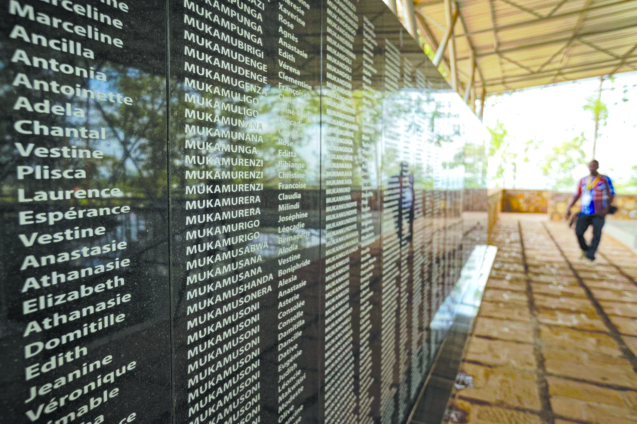Did you know that Ghanaians soldiers were among the few peacekeeping forces who continued to stay in Rwanda during the 1994 massacre in which close to a million people died? Well, Ghana remains special in the heart of many Rwandese for that show of courage even after the UN and other foreign forces rescued their own and abandoned the country as some Rwandans put it.
In a series of reports, Joy News sheds the light on the Rwandan story, lessons for Ghana and Africa, starting with the story of a survivor who was nine years old when the massacre started and now man’s the Kigali genocide memorial.
Pictures of those who were killed, hang on a wall inside the Kigali genocide memorial. Alongside these photographs of babies, women and children are some of their bones and skulls. It is one of some 230 memorials dotted across Rwanda, holding the remains of as many has been found from the nearly one million people killed; many of whom were butchered to death.
Dione was 9 years old when the Genocide started. On the day we met him as the Ghanaian delegation, he takes us around showing us the mass graves, leading us through a wreath-laying ceremony one step after the other told us a story he must have told a million times of how Rwandans used to live, their monarchy system, the presence of colonialist and how they believe processes to divide and rule, ended up setting up the country for the great fall with the genocide
Inside the genocide memorial are not just pictures and bones but personal belongings and clothes worn by those killed on the day they died. But the entire tour of the memorial begins with a very emotional video in which survivors tell the stories of close shaves with death, how they escaped, how their families were killed, some in their full glare and what the memorial means to them. "It is home’ one of them said ‘because this is where all my family members are and I always come around to connect with them."
For Dione who should be about 36 now, taking people through the history of Rwanda is work he has done since 2010 and it brings him some closure. His task, to make visitors understand not only the history of Rwanda but the institutionalisation of tribal divisions and eventually how the people started killing neighbours, friends and in some cases spouses. He even talks about a deliberate attempt to have HIV infected men, rape women to ensure they live with the consequences.
Bodies of some of these women, men and children littered in mass graves across the country have been exhumed and reburied here The history as told here at the memorial indicates the UN forces left as French soldiers failed to rescue Tutsis who were being butchered and sometimes buried alive. Ghanaian soldiers, however, led by general henry Kwame Anyidoho stayed on.
Rwandans like Dionne have not forgotten those Ghanaian soldiers "They are my heroes," he said.
He added that the Ghanaians soldiers showed people like him love and that humanity glowed in their eyes. For many, who know the Rwanda story, it the is role of the media and how politicians contributed money to spur on propaganda against one ethnic group that must never happen again to any African country.
As Rwanda opens up its economy to Ghana, it seems they want to say thank you but at the same time, learn from our painful experience.
Latest Stories
-
US man, 81, charged with murdering Uber driver after both targeted in scam
28 mins -
Tesla pushes for $56bn pay deal for Elon Musk
40 mins -
Toronto gold heist: Police arrest alleged gun-runner linked to C$20m airport theft
48 mins -
Dubai airport chaos as UAE and Oman reel from deadly storms
51 mins -
Akufo-Addo commissions Anwomaso 1 Thermal Power Plant in Kumasi
1 hour -
Change MASLOC into a digital lending platform – Citizens Movement against Corruption
3 hours -
Ghana’s Sports Minister proposes three interventions to combat climate change
5 hours -
Family of K.K Kabobo announces date for observance service
6 hours -
Unemployed Environmental Health graduates protest in Tamale
6 hours -
Dancer Championrolie named brand influencer for Tecno Camon30
7 hours -
Election 2024: National Peace Council cautions the clergy against spiteful comments
7 hours -
One person arrested in connection with robbery attack on UENR students
7 hours -
Basketmouth touts Dave Chappelle ‘comedy god’
7 hours -
It’s a shame ‘galamsey’ issues no longer make headlines – Sir Sam Jonah slams Ghanaian journalists
7 hours -
Stay original; don’t take anybody’s material – Basketmouth to comedians
7 hours

